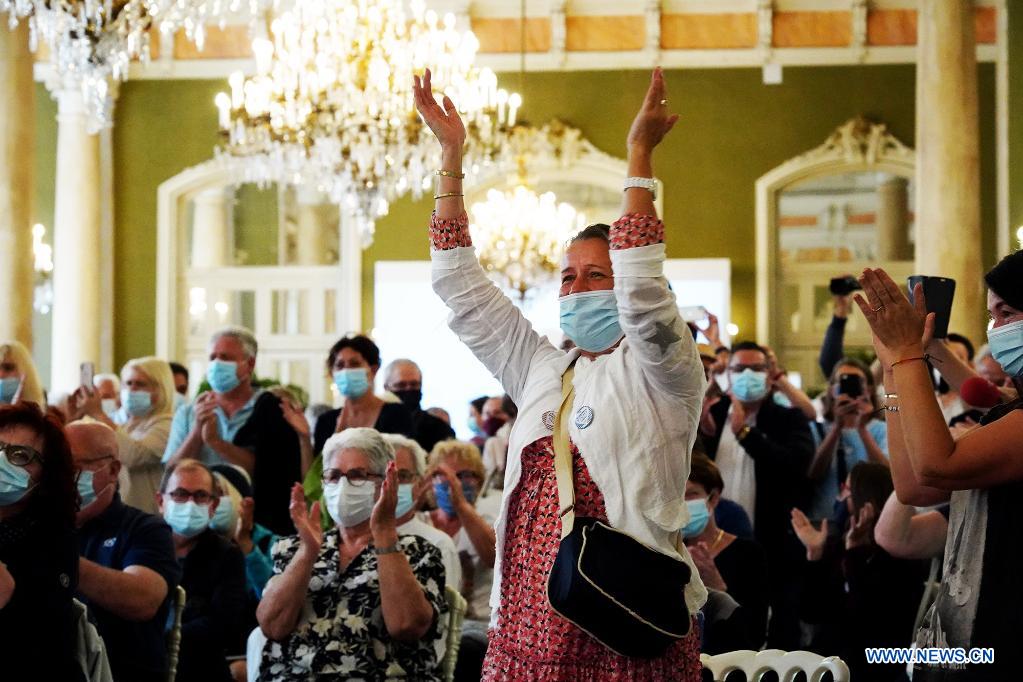French spa city Vichy revels in UNESCO World Heritage status
 0 Comment(s)
0 Comment(s) Print
Print E-mail Xinhua, July 27, 2021
E-mail Xinhua, July 27, 2021
Residents of Vichy, the famous spa resort in central France, are preparing a low-key music party with light show to mark the glory and responsibility of becoming World Heritage site, a prestigious status that their home won together with ten other towns in Europe.

"Taking into account the sanitary conditions, we couldn't have organized too big a celebration," said Anke Matthys, coordinator of Vichy's candidature for the transnational UNESCO (United Nations Educational, Scientific and Cultural Organization) World Heritage site under the name "Great Spas of Europe."
On agenda is a music party in the Parc des Sources -- a park laid out by Napoleon III in the center of town in 1812 -- on Thursday, and when night falls a "video mapping" on the facade of Palais des Congres-Opera, a jewel of the city's architectural heritage.
"It will be an artistic creation of sound and light, highlighting this monument, showing the 11 towns that make up this World Heritage site to make residents and visitors aware of the fact that we are a transnational candidacy," Matthys told Xinhua on Monday.
All these spa towns in Austria, Belgium, the Czech Republic, Germany, Italy, the United Kingdom and France have developed around natural mineral water springs and provide exceptional testimony to a complex urban typology and cultural movement.
"They bear witness to the international European spa culture that developed from the early 18th century to the 1930s... Together, these sites embody the significant interchange of human values and developments in medicine, science and balneology," said the World Heritage Committee last Saturday, when it announced their inscription on the World Heritage List during its 44th session held online and chaired from Fuzhou, China.
The session was followed minute by minute in Vichy. Giant screens were installed in the Napoleon III hall of Palais des Congres-Opera for people to follow the exchanges and the committee vote.
"The public were there since noon despite the weather and sanitary conditions. They were very interested," said Matthys. "It is important to transmit live the session even before the announcement of our candidacy, so that people realize the stakes and the responsibility that falls upon us once we become a World Heritage site."
When the good news hit in the afternoon, "it was really a great joy for us," he said.
The waters of Vichy have been in use since the Roman era. Since the 16th century, they have led to the development of a spa city that would serve as a model in terms of its urban organization based on a street plan radiating from the station towards the baths and parks, along with its prestigious architecture.
However, during World War II the town became the seat of the government of Vichy France (between 1940 and 1944), which adopted a policy of collaboration with Nazi Germany. In French, the term "Vichyste" indicated collaboration with the Vichy regime, often carrying a pejorative connotation.
"For us it is a problem that Vichy is often summed up and known by people for these four years, not for its history and its architecture as a spa town," regretted Matthys.
Yet he noted that the two factors are somewhat related. "It is because we have been a large spa city that welcomed the aristocracy and bourgeoisie of Europe that we had an enormous hotel capacity in the 1940s. The infrastructures linked to our history unfortunately led to the installation of this government in Vichy, which left us a black mark."
"Fortunately, now it has been clearly said that Vichy is above all a spa city. Once the 'queen of the spa cities', Vichy must be appreciated for this rightful reason now," he said.
Indeed, the city now offers guided tours for visitors who want to understand why that pro-Nazi government came to settle in Vichy and how it lived in this small town.
"This is part of the history that we have no problem tackling. And today the true history of Vichy is 2,000 years of hydrotherapy," said Matthys.
Will the UNESCO label bring about changes to the town? "We are convinced that this will have a positive impact on the image of the city and its attractiveness," said the coordinator for the transnational candidacy, who is also an urban planner.
"Despite the somewhat peculiar context at this time, we of course hope that the city will be attractive and interesting for all those who are interested in park-city, open-city, city of well-being, who enjoy beautiful architecture, who like a relaxing destination," he said.






Go to Forum >>0 Comment(s)